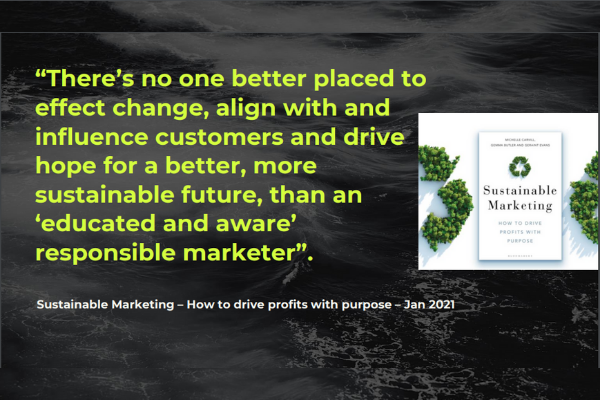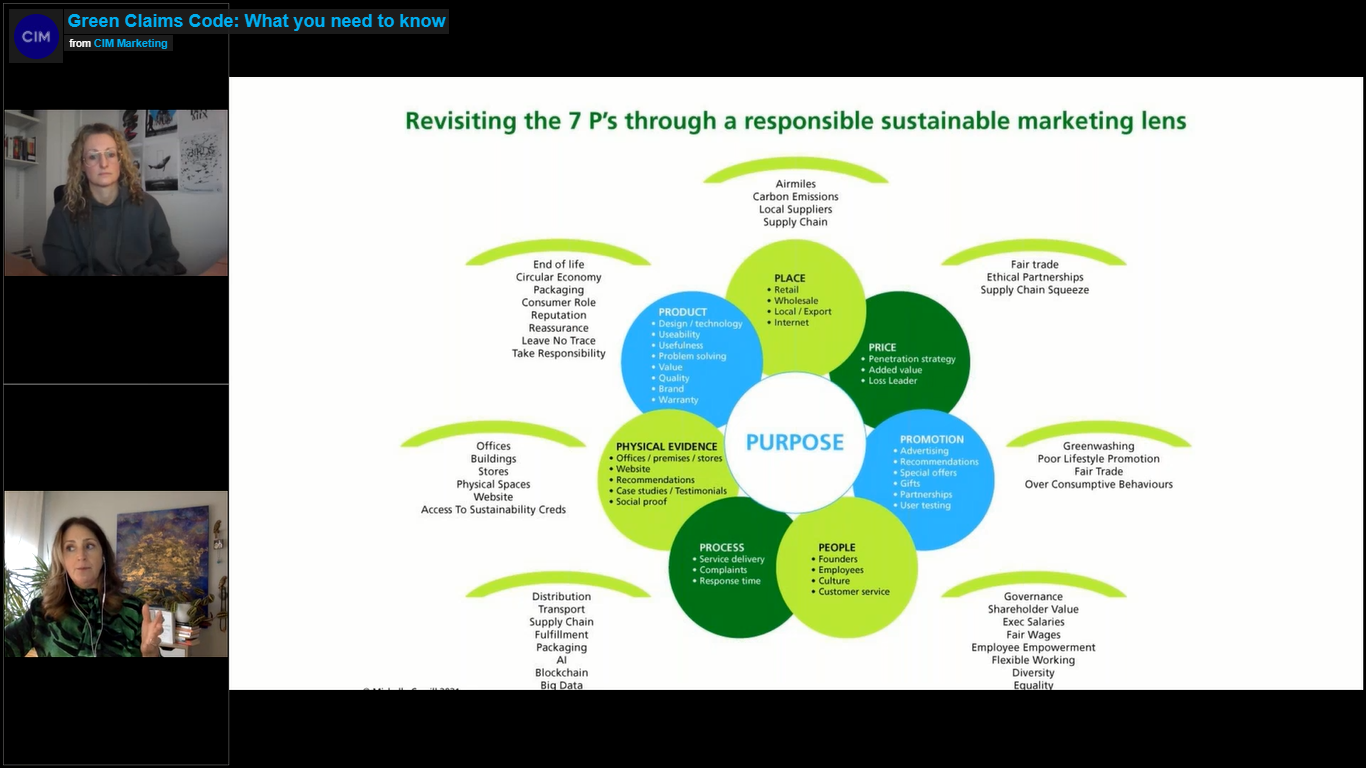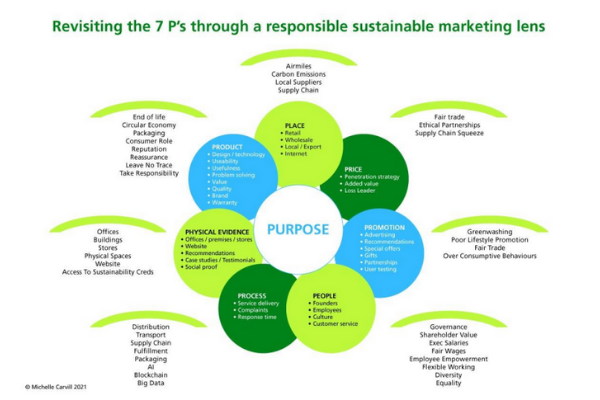It’s time to crack the Green Claims Code

- 11 March 2022
If you missed our recent webinar about the Competition and Markets Authority’s new Green Claims Code, keep reading to for a full breakdown of the new legislation, and discover why this mandate is so important for the future of sustainable businesses.
With CIM’s first ever Sustainability Summit having taken place on 31 March, the message has never been more timely. It is vital now more than ever that marketers fully grasp the importance of truly sustainable marketing and understand the impacts of getting it wrong after the recent introduction of the Green Claims Code.
What is sustainable marketing?
Sustainable marketing is described by authors of Sustainable Marketing: How to drive profits with purpose, Gemma Butler and Michelle Carvill as: “The extraordinary opportunity (and growing obligation) for business to become a source for good.”
This is an important place to start when considering the Green Claims Code. Marketers play a crucial role in driving the sustainability agenda, as they have the power to shape behaviours, create new ways of thinking and use their voices to reach, educate and inspire. Marketers are at the centre of communication for brands and businesses globally; they therefore have a responsibility to influence and be a catalyst for positive change.
It is imperative, therefore, that marketers are transparent and honest about the brands they represent and ensure authenticity in any campaigns or communications they deliver. Many brands are still being caught out by their false claims and empty promises, a falsehood that we now label as ‘greenwashing’, which the Green Claims Code aims to eradicate once and for all.
Say what you do - do what you say…
The UK’s Competition and Markets Authority (CMA) recently released the Green Claims Code, with the central aim of ending widespread greenwashing for good. Businesses will have to ensure their environmental claims comply with code or face the threat of prosecution. In the UK, the code states six key questions businesses must ask themselves:
- Are your claims truthful and accurate?
- Are your claims clear and unambiguous?
- Do your claims omit or hide important information?
- Do they only make fair and meaningful comparisons?
- Have you substantiated your claims?
- Do they consider the full lifecycle of a product?
Gemma Butler, marketing director at CIM, expresses the importance that marketers view the 7Ps of marketing through a sustainable lens as shown in the diagram below.
This new way of thinking has the power to influence the way a brand operates, in everything from the supply chains they use and partnerships they have, to the lifestyles and messages they promote to their products’ packaging, transport, and distribution, Butler believes.
Green means go!
One of the biggest difficulties businesses face when thinking about their sustainable journey is where to start. If this topic hasn’t been high on their agenda so far, how can they realistically change the way they operate to comply with the code, without the resources and budgets to do so?
To be successful in your sustainable journey, you must first look externally and consider the environment around you. As Michelle Carvill explains: “You can’t communicate effectively, you can’t plan, you can’t strategise as a marketer effectively if you do not have an understanding of the broader landscape you are operating in.” Look past your organisation through that sustainable lens and see for yourself what needs to be done, she advises.
Michelle goes on to suggest that: “Like any great marketing project, it’s important to understand where you are right now.” When a business has a real understanding of where they sit on the sustainable agenda, the claims they are making and where, whether this be online, offline on packaging, they are better placed to “understand what is in place and what more needs to be done,” Carvill shares.
Don’t make the claim if you can’t take the blame
When a business decides to make a green claim, Gemma Butler warns that they must “consider every single channel and touchpoint.” Yes, marketers must consider the six questions of the code, but also how their claims relate to their product and service, do they relate more to packaging? If your packaging comes from another supplier, you must “make sure that you understand the claims they’re making and are they true? Because ultimately, if you’re pushing them through your messaging, you could potentially have to answer some questions,” Butler concludes.
Remember too that you must consider if the claims are being made by businesses without marketing’s involvement, Butler continues, and if so, can other stakeholders provide evidence such as a strategy or report to back up their claim? “Is it coming from another department, is it coming from another part of the business internally? If so, question it, ask the questions of the Green Claims Code,” she adds.
The business in question must also provide access to additional information about their claims to their customers. They could provide direct links to reports and evidence; any claim that is more than two clicks away from evidence, or information looks suspicious and unreliable is more likely to cause more of a problem, Butler believes.
She goes on to reminds us that: “When broader claims are being made such as ‘helping to reduce waste’, ‘50% less packaging by 2025’, you will be asked to provide evidence of the strategy and action plans that you’ve put together to help back these claims up.”
When it comes to sticking to these claims, make sure everyone in your business is aware of your strategies, targets and plans. Update your employees on any progress you have made or any goals that have been met. Make sure everyone in your organisation is informed about the Green Claims Code, because, Butler highlights: “Whilst this type of regulation puts a spotlight on marketing, it’s actually a regulation for business it’s not regulation for marketers… the responsibility sits with the company making the claim.” Butler suggests that businesses provide training and create awareness around the code. Make sure, she urges, that employees are encouraged to take the time to read and understand the Green Claims Code and its implications.
“Before making a claim, if in doubt, don’t.”
To avoid backlash or accusations, businesses should avoid using generic words such as ‘recyclable’, ‘organic’ or ‘eco-friendly’, unless they can absolutely validate this with information that explains why they are able to use that word.
Gemma Butler requests: “Let’s not use [labels] that have a picture of a fish on there and say ‘ocean bound plastic’ because ultimately it doesn’t mean anything.”
Brands should also avoid making claims about goals they intend to meet in the future, unless they can provide a complete strategy that demonstrates how they will measure and meet these goals. Making claims based on ambitions do not work as “intentions are not actions.”
Only time will tell if the Green Claims Code will truly end greenwashing for good, but for now, any business hoping to embark on their sustainable journey should start by looking inwards. They should remember that any win or goal achieved towards sustainability is a big accomplishment and should be celebrated, both internally and externally.
It is the small changes and achievements being made by marketers and businesses every day that create the strong foundation for lasting change to grow and flourish. The more businesses that celebrate their small wins, the more they will encourage other organisations to do the same.
This webinar is available to all on demand via the CIM content hub.
If this article has you feeling inspired to help drive sustainable change forward, you can find more information and resources on CIM's Sustainable Transformation Hub.



Tags:
- 0 views

 FAQs
FAQs
 Log in
Log in
 MyCIM
MyCIM











